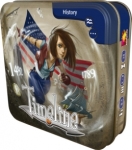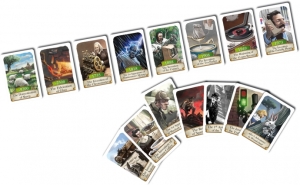Unplugged: Timeline (Boardgame)
 There are educational activities that are presented as games, and games that are designed to be educational. Far too often, the former makes its way to the marketplace rather than the latter. This results in a negative attitude toward any game marked as “educational.” Thankfully, the series of games entitled “Timeline” contain an entertaining game while also stealthily teaching history.
There are educational activities that are presented as games, and games that are designed to be educational. Far too often, the former makes its way to the marketplace rather than the latter. This results in a negative attitude toward any game marked as “educational.” Thankfully, the series of games entitled “Timeline” contain an entertaining game while also stealthily teaching history.
The card game easily lends itself to variations/expansions, so there is an entire line of Timeline card games, each contained in their own, relatively inexpensive, handy travel-proof tin. The basic idea of the game is for players to attempt to line up a series of cards. Each card represents a point in history and the goal is to line the cards up in chronological. The Timeline series has something for everyone. The game comes in many varieties: Inventions, Historical Events, Discoveries, Diversity, Music & Cinema, and the two new versions this year: American History and Americana.
The game is simple to play. Each player starts with a hand of cards and one is placed on the table (as more cards are added you get several cards lined up in historical order.) Players attempt to place their card into the correct spot on the table to preserve the correct order. (Each card has its appropriate date on the back, so no peeking until it is placed.) If it is placed correctly, it stays on the board. Incorrectly placed cards are removed but the active player much draw a new card into their hand to replace it. The game continues until someone manages to play all their cards.
The game starts out somewhat gently, since there are very few cards present it is easier to guess where one’s new card might go. However, as the game progresses the available options increase, making the last few rounds quite tricky indeed. For even more chaos, the various editions can be mixed to make things even trickier (was the screwdriver invented before or after Hamlet was written?)
The game is quite fun. It has a sort of casual challenge to it found in many family/party games. Yes, you can get lucky by guessing (or getting “easy” cards) but a more knowledgeable player will more than likely win the day. This leads to the games drawbacks but also its strength. After many plays, gamers will begin to memorize all the dates on the cards – forcing the game to become more of a “first one to make a mistake” sort of thing like the game Memory. However, this also means that the players have memorized quite a few historical dates or at least the events occurring in the correct order. Did you see what the designers did there? The players have just learned a bit of history. Even more impressive to me, the players have learned many of the dates in history (I’m always more of an “order of events” guy rather than hard dates.)
The various “flavors” of the game can be inferred from their titles. Inventions covers actual items (like the corkscrew) whereas Discoveries focuses on leaps in knowledge (like vaccination.) Diversity isn’t so much racial or cultural diversity but rather a hodge-podge of stuff like the invention of Tanks and the first appearance of a Superhero. This year’s contributions are American History and Americana. American history is straightforward, while Americana focuses on American culture like the trade of Babe Ruth to the Yankees and Lindberg’s flight across the Atlantic. Of the two, I prefer American History as it actually teaches historical events common to many social studies classes. I’m sure my poor knowledge of Americana has absolutely nothing to do with that preference.
Bottom Line:
The Timeline series is a fun, casual trivial game focused on historical events. It is simple to explain and requires no particular talent to play. Of course, more knowledgeable players will have an advantage. Personally, I’ve found giving out extra cards at the start as an excellent handicapping tool. It isn’t an expensive game, it’s fun, and educational to boot. What more do you want in a game?
Kid Factor:
Since there are pictures on every card, reading isn’t technically required. While a young player could go through the correct motions of the game, they would have very little chance of being correct later on in the game. I would suspect pre-teen as a good minimum age to start playing. Note that the game can even be played in a sort of “cooperative” mode where everyone helps to decide. This would lower the age limit a bit since younger kids could be guided along.






Discussion Area - Leave a Comment